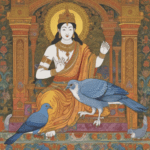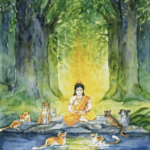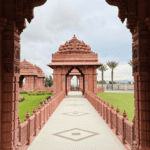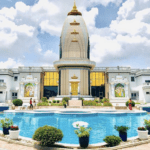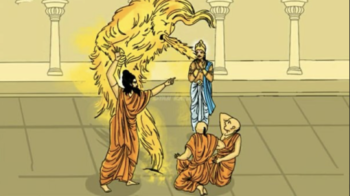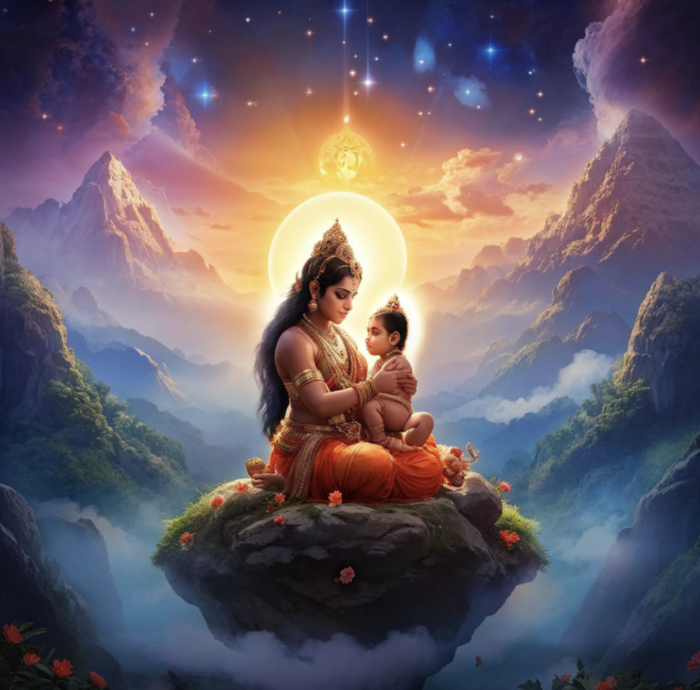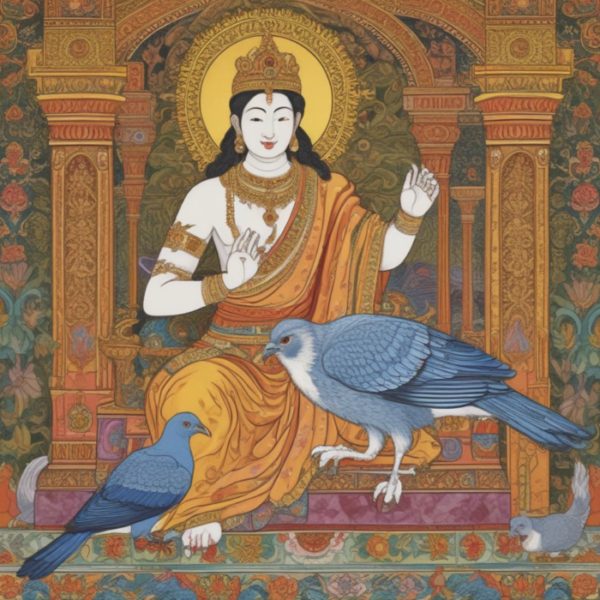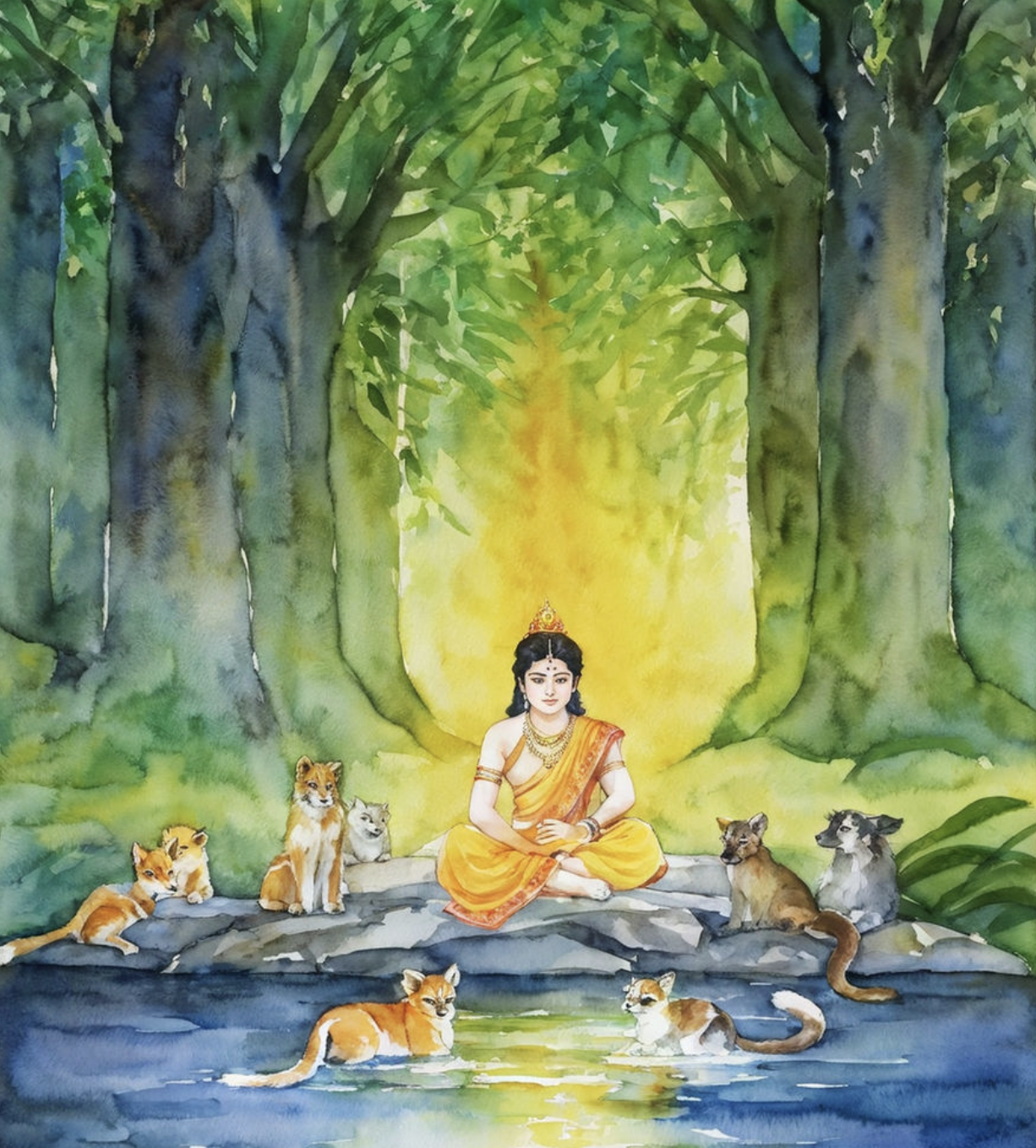The Tale of Unwavering Faith of King Ambarisha and Sage Durvasa’s Wrath
In the heart of Bharat, long ago, there lived a king whose devotion to dharma was as unwavering as the mountains and as deep as the oceans. King Ambarisha, a renowned ruler of the Ikshvaku dynasty, was known far and wide not only for his governance but for his unmatched devotion to Lord Vishnu. His rule was characterized by prosperity, peace, and a deep spiritual inclination, as he saw his role as a king not merely as a temporal leader but as a steward of divine principles.
Ambarisha was not just a king; he was a deeply devout Vaishnava, dedicating his life to the worship of Lord Vishnu. His kingdom flourished under his righteous rule, and his people admired him for his wisdom and humility. Despite his immense wealth and power, Ambarisha lived a life of simplicity, often immersing himself in prayers and fasting, seeking to please the Supreme Lord.
One of the most significant rituals King Ambarisha observed was the Ekadashi fast. This fast was an integral part of his devotion, observed with strict adherence to the sacred texts. Ambarisha would fast on Ekadashi, abstaining from food and drink, and then break his fast the next day, Dwadashi, after offering prayers and food to Lord Vishnu. It was during one such observance that an incident occurred, which would test the limits of Ambarisha’s devotion and patience.
On a particular Dwadashi, after spending the night in prayer and meditation, King Ambarisha prepared to break his fast with the usual rituals. Just as he was about to do so, a revered sage, known for his volatile temper, arrived at his palace. This sage was none other than Durvasa, famous throughout the cosmos for his ascetic powers and equally legendary wrath.
Durvasa, upon his arrival, was warmly received by King Ambarisha, who considered it a great honor to host such a distinguished guest. Ambarisha invited the sage to partake in the ritual meal, explaining that he was about to break his fast. Durvasa agreed but decided to first take a bath in the sacred Yamuna River before eating.
The king waited patiently for the sage’s return, but time was of the essence. The auspicious moment for breaking the fast was nearing its end, and according to the rules of the Ekadashi fast, it was imperative to break the fast within the stipulated time. Torn between his duty to respect his guest and his obligation to uphold the sacred fast, Ambarisha consulted his advisors. They suggested a middle path: the king could sip a small amount of water, which would technically break his fast, yet would be minimal enough not to constitute a meal.
Reluctantly, Ambarisha followed this advice, knowing that breaking his fast improperly would disrespect Lord Vishnu, and he consumed the water. At that moment, Sage Durvasa returned. When he learned that the king had broken his fast without waiting for him, his eyes flared with indignation. His voice, heavy with anger, filled the palace.
“King Ambarisha,” Durvasa thundered, “you have insulted me by breaking your fast in my absence. This is an act of disrespect! You, who claim to follow dharma, have shown great arrogance!”
Durvasa’s rage was palpable, and his eyes burned with a fiery intensity. In his anger, he pulled a strand of his matted hair and hurled it to the ground. From it, a fearsome being emerged, a fiery demon named Kritya, summoned to destroy Ambarisha. The king, witnessing this terrifying manifestation, remained calm and composed, placing his trust in Lord Vishnu. He stood unflinching, his heart steady, surrendering to the divine will.
As the fearsome Kritya advanced towards Ambarisha, ready to attack, something miraculous occurred. A dazzling, divine light emerged, illuminating the entire scene. It was the Sudarshana Chakra, the mighty discus of Lord Vishnu, a symbol of the Lord’s protection and power. The Sudarshana Chakra swiftly intercepted the demon, reducing it to ashes in an instant.
But the Sudarshana Chakra was not done. It then turned its attention towards Sage Durvasa, pursuing him with relentless speed. The sage, now filled with fear, realized the gravity of his mistake. He fled, with the divine weapon in close pursuit. Durvasa traversed the three worlds in desperation, seeking refuge and forgiveness. He approached various celestial beings, including Brahma and Shiva, but none could intervene against the will of Lord Vishnu.
Finally, exhausted and humbled, Durvasa sought refuge at the feet of Lord Vishnu in Vaikuntha. The compassionate Lord Vishnu listened to the sage’s plea but explained that the Sudarshana Chakra would only desist if Ambarisha himself forgave the offense. Realizing there was no other recourse, Durvasa returned to King Ambarisha, who had been waiting patiently for the sage’s return.
Durvasa fell at the king’s feet, begging for forgiveness. Ambarisha, who had harbored no ill will, immediately forgave the sage. He offered prayers to the Sudarshana Chakra, pleading for its retreat. The divine discus, satisfied with Ambarisha’s forgiveness and humility, ceased its pursuit and returned to Lord Vishnu’s abode.
Ambarisha, filled with compassion, offered hospitality to Durvasa, treating him with the utmost respect despite the sage’s previous actions. The king’s magnanimity and unwavering devotion left Durvasa humbled and deeply moved. The sage blessed Ambarisha, recognizing his exceptional piety and virtue. He realized that Ambarisha’s steadfast faith and humility were the true reflections of his greatness.
After the departure of Durvasa, King Ambarisha finally broke his fast, once again immersing himself in devotion to Lord Vishnu. His kingdom continued to thrive under his just and compassionate rule. The tale of Ambarisha’s unshakeable faith and Durvasa’s lesson in humility became legendary, echoing through the annals of time as a profound example of the power of devotion and forgiveness.
Ambarisha’s story stands as a testament to the virtues of patience, humility, and unwavering faith in the divine. It serves as a reminder that true strength lies not in physical power or wealth but in the purity of one’s heart and the sincerity of one’s devotion. Through his actions, Ambarisha exemplified the highest ideals of dharma, showing that forgiveness and compassion are the true markers of spiritual greatness.
And so, the story of Ambarisha and Durvasa endures, a timeless narrative of divine protection and the transformative power of forgiveness. It continues to inspire generations, teaching that the path of righteousness, though often fraught with trials, ultimately leads to divine grace and eternal peace.


